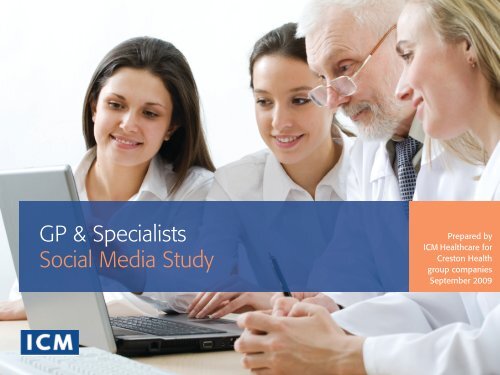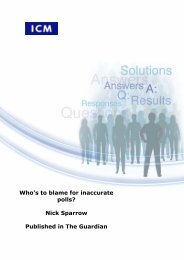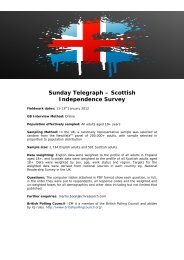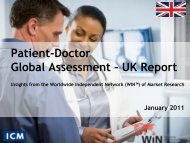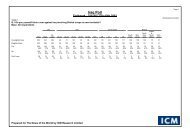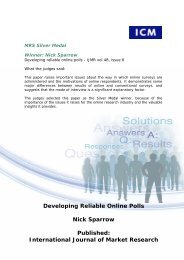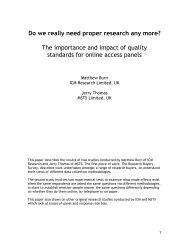GP & Specialists Social Media Study - ICM Research
GP & Specialists Social Media Study - ICM Research
GP & Specialists Social Media Study - ICM Research
Create successful ePaper yourself
Turn your PDF publications into a flip-book with our unique Google optimized e-Paper software.
<strong>GP</strong> & <strong>Specialists</strong><br />
<strong>Social</strong> <strong>Media</strong> <strong>Study</strong><br />
Prepared by<br />
<strong>ICM</strong> Healthcare for<br />
Creston Health<br />
group companies<br />
September 2009
Contents<br />
1 Objectives 3<br />
2 Executive Summary 5<br />
■ Key Takeout 6<br />
3 Findings in Details 7<br />
a: Sources of Medical Information 8<br />
■ Current Usage 9<br />
■ Future Usage 11<br />
b: <strong>Social</strong> <strong>Media</strong> 14<br />
4 Methodology & Sample 20<br />
5 Creston Health Group Companies 23<br />
Ben Gibbons, Head of Healthcare, <strong>ICM</strong> <strong>Research</strong><br />
Tel: +44 (0) 20 7845 8320 email: ben.gibbons@icmresearch.co.uk
Objectives<br />
03
<strong>Research</strong> Objectives<br />
■ Identify how useful current sources<br />
of medical information are and<br />
predictions for future usage<br />
■ Demonstrate the existing and future<br />
role of social media, including<br />
motivations for usage<br />
04
Executive Summary<br />
05
Key Takeout<br />
Digital, <strong>Social</strong> <strong>Media</strong> and Pharma Industry<br />
Online medical media is already seen on a par with traditional medical journals<br />
by UK physicians – notably one in three specialists perceive online consumer<br />
websites to be useful<br />
<strong>Social</strong> media is already central to the role of one in six physicians and they<br />
predict digital communication and information sources, such as e-Detailing and<br />
virtual meetings are to increase substantially<br />
One in five will often have been actively reviewing forums, one in twenty UK<br />
physicians have actually written on a blog relating to their professional role in<br />
the past 12 months – nearly half of specialists have used Wikipedia<br />
<strong>Social</strong> media could have a defining role in UK healthcare due to the patient<br />
choice agenda, the virtual health experience and even virtual consultations<br />
06
Findings in detail<br />
07
<strong>GP</strong>s Usefulness of information sources<br />
Over three-quarters of <strong>GP</strong>s rate online medical website as useful,<br />
notably almost a third also find networking sites useful<br />
Q1 Please indicate how useful the following possible sources of medical information are to you currently?<br />
Very useful<br />
Quite useful<br />
Not very useful<br />
Not at all useful<br />
N/A<br />
21%<br />
65%<br />
11%<br />
Traditional<br />
Print<br />
<strong>Media</strong><br />
25%<br />
53%<br />
17%<br />
2%<br />
1%<br />
Online<br />
<strong>Media</strong><br />
Medical<br />
4%<br />
2%<br />
16%<br />
41%<br />
35%<br />
7%<br />
Online<br />
<strong>Media</strong><br />
Consumer<br />
2% 2%<br />
4%<br />
22%<br />
53%<br />
18%<br />
5%<br />
Medical<br />
Symposium<br />
/Meetings<br />
2%<br />
21%<br />
40%<br />
22%<br />
13%<br />
Online/<br />
Virtual<br />
Meetings<br />
17%<br />
34%<br />
33%<br />
15%<br />
Online/Virtual<br />
Sales Rep<br />
Presentations<br />
6%<br />
24%<br />
33%<br />
25%<br />
12%<br />
<strong>Social</strong>/<br />
Professional<br />
Networking<br />
Sites<br />
9%<br />
52%<br />
26%<br />
11%<br />
Pharmaceutical<br />
Representatives<br />
Net: Useful 86%<br />
77%<br />
18%<br />
75% 25% 18% 30% 62%<br />
Net: Not Useful 13%<br />
21%<br />
76%<br />
23% 62% 67% 58% 36%<br />
Base: All <strong>GP</strong>s (n=352)<br />
08<br />
2%
<strong>Specialists</strong> Usefulness of information sources<br />
9 out of 10 view online medical media as useful as print, interestingly<br />
nearly one in four specialists rate online consumer media, as useful<br />
to their role<br />
Q1 Please indicate how useful the following possible sources of medical information are to you currently?<br />
Very useful<br />
Quite useful<br />
Not very useful<br />
Not at all useful<br />
N/A<br />
49%<br />
43%<br />
7%<br />
Traditional<br />
Print<br />
<strong>Media</strong><br />
1%<br />
1%<br />
55%<br />
37%<br />
7%<br />
Online<br />
<strong>Media</strong><br />
Medical<br />
6%<br />
23%<br />
48%<br />
Online<br />
<strong>Media</strong><br />
Consumer<br />
46%<br />
Medical<br />
Symposium<br />
/Meetings<br />
6%<br />
23%<br />
38%<br />
41%<br />
45%<br />
25%<br />
22%<br />
23%<br />
1%<br />
21%<br />
3%<br />
10%<br />
3%<br />
1%<br />
11%<br />
14%<br />
7%<br />
12%<br />
4%<br />
Online/<br />
Virtual<br />
Meetings<br />
9%<br />
29%<br />
Online/Virtual<br />
Sales Rep<br />
Presentations<br />
9%<br />
30%<br />
31%<br />
<strong>Social</strong>/<br />
Professional<br />
Networking<br />
10%<br />
49%<br />
Pharmaceutical<br />
Representatives<br />
Net: Useful 92%<br />
92%<br />
29%<br />
87% 29% 12% 39% 59%<br />
Net: Not Useful 8%<br />
8%<br />
69%<br />
13% 60% 73% 53% 37%<br />
Base: All <strong>Specialists</strong> (n=195)<br />
4%<br />
09
Catherine Warne<br />
Managing Director, Red Door Communications<br />
“One of the challenges that we often get from clients is to quantify the value of online versus print<br />
coverage. I can’t deny the satisfaction of seeing the results of a media campaign in print; however the<br />
research shows very little difference in how <strong>GP</strong>s and consultants rate print versus online media as a<br />
source of information.<br />
Respondents also predicted that their use of online media as a source of medical information will increase.<br />
With over a quarter of <strong>GP</strong>s and a third of specialists also predicting an increase in social/professional networking<br />
sites as sources of medical information we have an opportunity to expand the way in which we communicate<br />
with our customers.<br />
The opportunity for the industry and healthcare communications will be realised if we fully understand the needs<br />
of our audiences and deliver information in a way that meets these. This could mean adapting the traditional<br />
press release to become a social media release (ensuring it is certified for this use) and developing an online<br />
strategy and offering that engages with customers via online platforms. Engage is a critical word – companies can<br />
no longer just ‘release’ information via digital platforms (e.g. flat websites) and see a return on their investment.<br />
With the Code of Practice high on all our agendas this doesn’t need to be a brand specific activity. Let’s think<br />
corporately or across portfolios to test the theory. We have to be brave – listen to our customers, offer something<br />
to them, develop relationships and be prepared for the multiple-interactions we’ll see as a result.”<br />
10
<strong>GP</strong>s<br />
Predicted future usage of information sources<br />
<strong>GP</strong>s view the future of medical information to be very much digitally focused,<br />
alongside the growth in medical websites, there is likely to be increased usage<br />
of virtual meetings, potentially in place of rep presentations<br />
Q1a Please indicate whether you think your use of the following as possible sources of medical information will have increased or<br />
decreased in 3 years time?<br />
Increased<br />
Stay the<br />
same/NA<br />
Decreased<br />
Base: All <strong>GP</strong>s (n=352)<br />
6%<br />
62%<br />
33%<br />
Traditional<br />
Print<br />
<strong>Media</strong><br />
73%<br />
24%<br />
Online<br />
<strong>Media</strong><br />
Medical<br />
2%<br />
28%<br />
62%<br />
11%<br />
Online<br />
<strong>Media</strong><br />
Consumer<br />
13%<br />
64%<br />
23%<br />
Medical<br />
Symposium<br />
/Meetings<br />
35%<br />
57%<br />
7%<br />
Online/<br />
Virtual<br />
Meetings<br />
31%<br />
58%<br />
11%<br />
Online/Virtual<br />
Sales Rep<br />
Presentations<br />
27%<br />
63%<br />
10%<br />
<strong>Social</strong>/<br />
Professional<br />
Networking<br />
Sites<br />
7%<br />
50%<br />
43%<br />
Pharmaceutical<br />
Representatives<br />
11
<strong>Specialists</strong><br />
Predicted future usage of information sources<br />
Nearly half of <strong>Specialists</strong> believe there will be an increase in virtual<br />
meetings, consumer media is seen to play a growing role as a source<br />
for medical information<br />
Q1a Please indicate whether you think your use of the following as possible sources of medical information will have increased or<br />
decreased in 3 years time?<br />
Increased<br />
Stay the same<br />
Decreased<br />
6%<br />
53%<br />
41%<br />
Traditional<br />
Print<br />
<strong>Media</strong><br />
Base: All <strong>Specialists</strong> (n=195)<br />
84%<br />
15%<br />
Online<br />
<strong>Media</strong><br />
Medical<br />
2%<br />
37%<br />
56%<br />
7%<br />
Online<br />
<strong>Media</strong><br />
Consumer<br />
21%<br />
69%<br />
10%<br />
Medical<br />
Symposium<br />
/Meetings<br />
47%<br />
49%<br />
5%<br />
Online/<br />
Virtual<br />
Meetings<br />
25%<br />
66%<br />
9%<br />
Online/Virtual<br />
Sales Rep<br />
Presentations<br />
37%<br />
56%<br />
6%<br />
<strong>Social</strong>/<br />
Professional<br />
Networking<br />
Sites<br />
8%<br />
59%<br />
33%<br />
Pharmaceutical<br />
Representatives<br />
12
Ben Davies<br />
Managing Director, PAN Advertising<br />
“Whilst it is heartening to see that around 60% of both <strong>GP</strong>s and specialists currently find representatives<br />
from Pharma companies a useful source of information, the situation is clearly changing fast. This is<br />
evidenced by the dramatic predicted increase in usage of both online/virtual rep presentations and<br />
meetings, alongside an equally dramatic fall in traditional rep presentations. The industry should not be<br />
too disheartened by this; sales forces have already been dramatically downsized by most of the major<br />
players, and the significant associated reductions in overhead will help to ease the pain of the tricky<br />
patent-expiry years ahead.<br />
The key to effective and efficient communication in the future lies in a well-balanced and cohesive mix of both<br />
personal and non-personal communication channels. One of the most exciting developments to maximise this is<br />
the advent of Closed Loop Marketing (CLM). Effective CLM programmes utilise all available routes to ensure the<br />
most relevant, engaging and motivating communication or information reaches the HCP at the right time via the<br />
appropriate media for them. Multiple channels are used to reach the HCPs ranging from representatives, e-details,<br />
e-mails, websites and podcasts through to social media (providing the necessary permissions have been sought).<br />
CLM allows a continuous, integrated dialogue with the audience providing them with information and other<br />
services. This also provides valuable information back to marketing, who can use this to spot trends or issues, and<br />
ultimately to drive future segmentation, messaging and sales force effectiveness<br />
Finally, all marketing efforts must be underpinned by a constant mission by Pharma to be viewed and treated as a<br />
trusted source of information, much like medical professionals themselves. Only then will online really get the<br />
credit it deserves.”<br />
13
<strong>GP</strong>s versus <strong>Specialists</strong><br />
<strong>Social</strong> media activity over last 12 months<br />
Approaching half of <strong>Specialists</strong> have used Wikipedia – over one in five are<br />
reviewing forums that relate to their clinical role in the past 12 months<br />
Q2 Thinking about the types of social media you use relating to your role as a <strong>GP</strong> / Specialist how active or inactive have you been<br />
over the last 12 months?<br />
<strong>GP</strong>s Net very/fairly active<br />
<strong>Specialists</strong> Net very/fairly active<br />
44% 45%<br />
36%<br />
45%<br />
26% 33%<br />
Review sites Wikipedia Reviewing<br />
internet forums<br />
Significant difference between <strong>GP</strong>/Specialist<br />
22% 22% 15% 12% 15% 9%<br />
Participating in<br />
internet forums<br />
Base: All respondents: <strong>GP</strong>s (n=352), <strong>Specialists</strong> (n=195)<br />
Video sharing<br />
sites<br />
Other <strong>Social</strong><br />
<strong>Media</strong><br />
14% 13% 13% 11% 12% 17%<br />
<strong>Social</strong><br />
Networking<br />
Sites<br />
5% 4%<br />
Reading blogs Podcasts Writing blogs<br />
14
<strong>GP</strong>s versus <strong>Specialists</strong><br />
Motivations for using social media<br />
Learning and self-development is the main reason for using social media<br />
in their role. <strong>Specialists</strong> are more likely than <strong>GP</strong>s to want to share their<br />
experiences and influence others<br />
Q2a Thinking about social media you use relating to your role as a <strong>GP</strong>/Specialist, what is your main motivation<br />
for using <strong>Social</strong> <strong>Media</strong>?<br />
Learning and<br />
self-development<br />
Connection to<br />
peers/identify<br />
like-minded healthcare<br />
Having an outlet for my<br />
opinions and creative side<br />
Sharing own experiences<br />
to help others make<br />
right decisions<br />
Being the first to discover<br />
something new<br />
Feeling that I'm influencing<br />
peers with my opinions<br />
5%<br />
5%<br />
4%<br />
8%<br />
2%<br />
2%<br />
4%<br />
1%<br />
17%<br />
16%<br />
Base: All respondents: <strong>GP</strong>s (n=352), <strong>Specialists</strong> (n=195)<br />
12% <strong>Specialists</strong> ‘sharing’<br />
64%<br />
72%<br />
Significant difference between <strong>GP</strong>/Specialist<br />
<strong>Specialists</strong><br />
<strong>GP</strong>s<br />
15
Ross Taylor<br />
Chief Digital Officer, tmwdigitalhealth<br />
“Both <strong>GP</strong>s and consultants are placing ever increasing importance on using social media spaces to extend<br />
their learning and self development. This is the area where the new opinion leaders will be born, will<br />
build their reputation, and will gain the respect and following of their peers. Currently, only 4% of<br />
consultants, and 1% of <strong>GP</strong>s see social media as a way of influencing their peers with their opinions,<br />
but it will be these individuals who become the opinion leaders of the future. They are defined not by the<br />
number of publications, citations or affiliations, but by their energy, enthusiasm, passion for their craft and<br />
commitment to sharing.<br />
The industry can seek out those who are most active in these spaces, and give them the information, skills and<br />
tools to enable them to extend their influence and continue the debate across a broader platform. This can be<br />
done via traditional advocacy activities or by reaching people online.<br />
Whilst the true spirit of social media activities is not to ‘own’ discussions, but rather listen before shaping or<br />
reacting to conversations, this lack of control does represent a complex problem. In theory, there are methods that<br />
can be put in place to enhance control, such as a delayed or moderated comment/ forum areas on websites.<br />
Sponsorship statements outlining that whilst the site has been provided by a company, the content is not<br />
influenced or moderated could also be explored. This research shows that the use of social/ professional<br />
networking sites as sources of information is set to grow in the next three years. As an industry, we need to find<br />
our way through the complexities of aligning the spirit of the Code of Practice with the spirit of social media to<br />
engage and interact with healthcare professionals online.”<br />
16
Future role of social media<br />
<strong>Social</strong> media will have a crucial role in the future of healthcare provision. Increased<br />
choice and access to health information will lead to increased patient empowerment.<br />
Virtual consultations would have dramatic affect on the delivery healthcare services.<br />
Q2b Now thinking about the role of social media within healthcare provision, to what extent do you agree<br />
or disagree with the following statements?<br />
In the future, the 'patient choice' agenda will become more central to healthcare<br />
provision due to the increase in patients accessing health information online<br />
Patients will be able to have a 'virtual healthcare experience' before choosing to<br />
book an appointment at a hospital<br />
‘Virtual’ consultations with a <strong>GP</strong> or nurse will become a reality in the future<br />
Base: All respondents: <strong>GP</strong>s (n=352), <strong>Specialists</strong> (n=195)<br />
% agree % disagree<br />
<strong>GP</strong>s <strong>Specialists</strong> <strong>GP</strong>s <strong>Specialists</strong><br />
63% 78% 11% 8%<br />
53% 59% 18% 16%<br />
49% 48% 24% 24%<br />
Significant difference between <strong>GP</strong>/Specialist<br />
17
Future role of social media<br />
The use of social media will greatly influence behaviour of physicians, four in ten<br />
attending less events as symposia and networking opportunities will be available<br />
online – already social media is central to the role of one in eight UK physicians.<br />
Q2b Now thinking about the role of social media within healthcare provision, to what extent do you agree<br />
or disagree with the following statements?<br />
In the future I will attend fewer medical conferences as presentations, symposia<br />
and networking opportunities will be available online<br />
<strong>Social</strong> media will become central to my role in the future<br />
<strong>Social</strong> media is currently central to my role<br />
Base: All respondents: <strong>GP</strong>s (n=352), <strong>Specialists</strong> (n=195)<br />
% agree % disagree<br />
<strong>GP</strong>s <strong>Specialists</strong> <strong>GP</strong>s <strong>Specialists</strong><br />
41% 38% 30% 43%<br />
21% 23% 53% 45%<br />
14% 12% 70% 68%<br />
18
Matthew Burn<br />
Director, <strong>ICM</strong> <strong>Research</strong><br />
“<strong>Research</strong> insight tells you something you didn’t know, confirms something you did know or questions<br />
your current thinking. With this research we have investigated the sources of medical information<br />
currently favoured by healthcare professionals. More importantly we have also asked respondents to<br />
predict their future use of both online and offline sources of information. Combined with experience and<br />
good judgement, insight provides a strong platform for effective decision making. This enables companies<br />
to maximise opportunities as they develop, or even better take a leadership role and place themselves<br />
head of the curve.<br />
For example, the research suggests a massive shift in the way <strong>Specialists</strong> and <strong>GP</strong>s expect to treat patients –<br />
predicting a substantial increase in online consultations. To give this claim some context, if just 5% of<br />
consultations went online it would equate to over 9million online consultations per annum. This may seem a<br />
long way off, but the speed with which technology and trends are developing, pharmaceutical companies should<br />
start to examine what this, and the other findings from the insight, might mean for them.”<br />
19
Methodology & Sample<br />
20
Methodology<br />
■ Online Interviews were conducted<br />
with a national sample of <strong>GP</strong>s and<br />
Hospital Consultant grade specialists<br />
■ Interviews were approximately<br />
7 minutes long<br />
■ Interviews were completed between<br />
20th & 25 May 2009<br />
■ Interviews were conducted via<br />
<strong>ICM</strong>’s Primary Care and Specialist<br />
research panels<br />
21
Sample Profile<br />
Number and (%) of interviews<br />
Region<br />
Total<br />
Year Qualified<br />
South<br />
210<br />
(38%)<br />
<strong>GP</strong>s<br />
352<br />
(64%)<br />
North Midlands<br />
146<br />
(27%)<br />
Before 1970 1970-1979<br />
13<br />
(2%)<br />
547<br />
<strong>Specialists</strong><br />
195<br />
(36%)<br />
122<br />
(22%)<br />
116<br />
(21%)<br />
Scotland Wales Northern Ireland<br />
37<br />
(7%)<br />
1980-1989 1990-1999 2000 or after<br />
256<br />
(47%)<br />
Male<br />
423<br />
(77%)<br />
22<br />
(4%)<br />
134<br />
(24%)<br />
Female<br />
124<br />
(23%)<br />
10<br />
(2%)<br />
28<br />
(5%)<br />
22
Creston Health Companies<br />
Red Door Communications is a specialist consultancy dedicated to developing and managing UK and international<br />
healthcare communication programmes. We are an indispensable part of our clients’ teams providing energising<br />
ideas and connections to maximise their brand’s success.<br />
Contact: Catherine Warne, +44 (0)20 8392 8040, cwarne@rdcomms.com<br />
ROCK medical communications is the specialist medical education division of Red Door Communications; we<br />
partner our clients to build ‘rock solid’ foundations based on true insights that enable brands to reach their full<br />
potential no matter what stage of the life cycle.<br />
Contact: Jo Satchell, +44 (0)20 8392 6926, jo.satchell@rockmedcomms.com<br />
PAN Advertising is a leading UK healthcare advertising agency, providing expertise to pharmaceutical and<br />
healthcare clients in global and European branding, brand positioning, advertising and promotion.<br />
Contact: Ben Davies, +44 (0)20 8948 2020, ben.davies@pancomms.com<br />
tmwdigitalhealth is focused on providing digital expertise in healthcare marketing, combining specialist in-house<br />
healthcare knowledge with the agency's consumer marketing experience to create innovative and effective<br />
communications across a full range of digital channels including web, email, mobile and social spaces.<br />
Contact: Ross Taylor, +44 (0)20 7349 6993, rtaylor@tmw.co.uk


